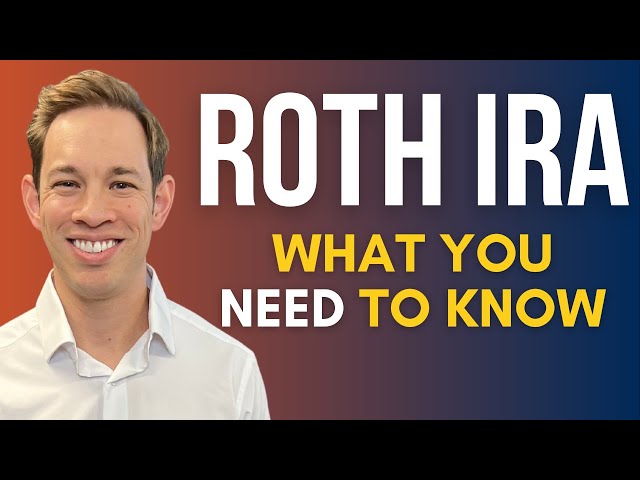The Benefits of Roth IRA: A Comprehensive Guide
Welcome to our comprehensive guide on the benefits of a Roth IRA. In this article, we will delve into the advantages of a Roth IRA and explain why it is a valuable investment tool for your financial future.
What is a Roth IRA?
A Roth IRA, or Individual Retirement Account, is a retirement savings account that offers unique tax advantages. Unlike traditional IRAs, contributions to a Roth IRA are made with after-tax income. This means that withdrawals in retirement are tax-free, including both contributions and earnings, as long as certain conditions are met.
Tax-Free Growth
One of the primary benefits of a Roth IRA is the potential for tax-free growth. Since contributions are made with after-tax income, any earnings within the account can grow tax-free over time. This can lead to significant savings in the long run, as you won’t owe any taxes on the growth when you withdraw the funds in retirement.
Flexible Withdrawals
Another advantage of a Roth IRA is the flexibility it offers in terms of withdrawals. Unlike traditional IRAs, which require minimum distributions at a certain age, Roth IRAs have no mandatory withdrawal requirements. This means that you can choose when and how much to withdraw, allowing for more control over your retirement income.
Tax-Free Qualified Distributions
Qualified distributions from a Roth IRA are entirely tax-free. To qualify, you must meet two basic conditions: the account must be open for at least five years, and you must be at least 59½ years old. By adhering to these criteria, you can enjoy tax-free withdrawals of both contributions and earnings, providing a significant advantage over other retirement savings options.
Additional Benefits
Aside from tax advantages, Roth IRAs offer several other benefits:
Flexibility: Contributions to a Roth IRA can be withdrawn at any time without penalty, making it a versatile savings vehicle for emergencies or large expenses.
No Required Minimum Distributions (RMDs): Unlike traditional IRAs, Roth IRAs do not have RMDs during your lifetime. This allows you to maintain control over your savings and potentially pass on a tax-free inheritance to your beneficiaries.
Conversion Opportunities: If you have a traditional IRA or an employer-sponsored retirement plan, you can convert it to a Roth IRA. While you will owe taxes on the converted amount, this can be a strategic move to take advantage of Roth IRA benefits.

In conclusion, a Roth IRA offers numerous benefits that can enhance your retirement savings strategy. From tax-free growth and flexible withdrawals to the advantage of tax-free qualified distributions, a Roth IRA provides valuable advantages for your financial future. Consider consulting with a financial advisor to determine if a Roth IRA is the right choice for you.
Frequently Asked Questions about the Benefits of Roth IRA
1. What is a Roth IRA?
A Roth IRA is an individual retirement account that allows you to contribute after-tax income and enjoy tax-free growth and withdrawals in retirement.
2. What are the advantages of a Roth IRA?
The main advantages of a Roth IRA include tax-free withdrawals in retirement, the potential for higher after-tax returns, and no required minimum distributions (RMDs) during the account owner’s lifetime.
3. Can anyone contribute to a Roth IRA?
No, there are income limits for contributing to a Roth IRA. However, there are ways to convert traditional IRAs into Roth IRAs regardless of income.
4. Are Roth IRA contributions tax-deductible?
No, Roth IRA contributions are not tax-deductible since they are made with after-tax income.
5. What is the maximum contribution limit for a Roth IRA?
The maximum contribution limit for a Roth IRA in 2021 is $6,000, or $7,000 if you are aged 50 or older.
6. Can I withdraw my contributions from a Roth IRA penalty-free?
Yes, you can withdraw your contributions from a Roth IRA at any time without penalties or taxes since you have already paid taxes on that money.
7. Are there any exceptions for penalty-free withdrawals of earnings from a Roth IRA?
Yes, there are certain exceptions, such as using the funds for a first-time home purchase, qualified education expenses, or in case of disability.
8. Can I continue contributing to a Roth IRA after age 70 1/2?
Yes, unlike traditional IRAs, there is no age limit for contributing to a Roth IRA, as long as you have earned income.
9. Can I convert my traditional IRA to a Roth IRA?
Yes, it is possible to convert a traditional IRA to a Roth IRA, but you will have to pay taxes on the converted amount.
10. What happens to my Roth IRA when I pass away?
Your Roth IRA can be passed on to your beneficiaries, who can continue to enjoy tax-free growth and withdrawals based on the rules that apply to inherited Roth IRAs.




